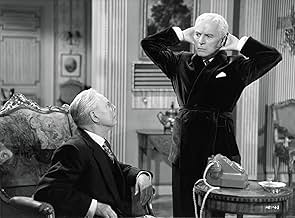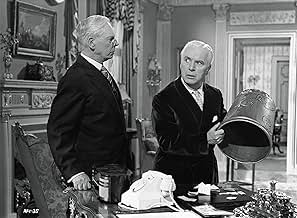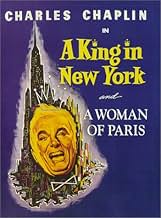IMDb RATING
7.0/10
9.5K
YOUR RATING
A recently-deposed European monarch seeks shelter in New York City, where he becomes an accidental television celebrity and is later wrongly accused of being a Communist.A recently-deposed European monarch seeks shelter in New York City, where he becomes an accidental television celebrity and is later wrongly accused of being a Communist.A recently-deposed European monarch seeks shelter in New York City, where he becomes an accidental television celebrity and is later wrongly accused of being a Communist.
- Awards
- 1 win & 1 nomination total
- Director
- Writer
- All cast & crew
- Production, box office & more at IMDbPro
Featured reviews
A great film that was neglected by the good old US of A when it was released in the late 50's. It was brandished as being to critical of the political atmosphere of the United States at the time. It's funny that Chaplin could manage to offend both Adolf Hitler (The Great Dictator) and the fascist-like/inspired 'anti-communist' movement of the 50's/early 60's U.S.A. There is actually a common link in those two movements (Naziism and the 50-60's 'anti-communist movement in the USA but I won't get into that here). Anyway, it is sad that this film is overlooked as it is one of Chaplin's best and should be looked as one in a career overview of this great filmmaker. Besides him, in the film there really is not any awe-inspiring actor/actress but Chaplin brings out the best in everyone and elevates them from eternal anonymity to something of recognition. His son Michael Chaplin for example is used quite wonderfully in this film. I later bought Michael Chaplin's late teenage memoir 'I Couldn't Smoke the Grass on my Father's Lawn' based on seeing him in this film and him impressing me so. It's too bad he could not develop more as an actor or recording star (he released a single in Britain in the mid-60's). I heartily recommend this film. See it and be open minded. Take a look at the way your country was run 50 years ago and ask yourself have things really changed this day in age when the 'communists' have know been replaced by the 'terrorists'.
A King In New York was a pure delight to watch. Seeing perhaps the greatest actor of the first half of the century is always a treat and he doesn't disappoint in this film. Chaplin made this satire as a shot at the United States, who only five years earlier had denied him re-entry into the country. This was based on the fact he wouldn't come before the McCarthy hearing and make a statement on his supposed ties to the Communist party. Regardless of the basis for this film's comedy pieces, one can find a few moments where Chaplin is taking a direct shot at those who had doubted him.
The plot involves Chaplin as King Shadov, a ruler of a ficticious country whose people have ousted him based on his unwillingness to manufacture Atomic Bombs. He would rather spend the taxpayers money on finding ways to create atomic energy. Obviously this is a deliberate analogy of Chaplin being thought of as a communist although the complete opposite was the truth. So, the exiled leader goes to America in search of a fun vacation in which he can experience the excitement that he had heard about so many times before. The viewer follows Shadof and his trust aide throughout New York City and their many hilarious experiences. The best of which that come to mind are the scenes in which Chaplin pantomimes his order to a waiter who cannot hear him, the scene in which Chaplin recites the famous "to be or not to be" soliloque from Hamlet to guests at a dinner party and the scene in which Chaplin gets his finger stuck in a fire hose and cannot get it out.
One can see some elements of the tramp in Chaplin in this film including the facial expressions, his smile and the way he moves about gracefully. I had never seen Chaplin in a talking film before this one and was somewhat surprised to see how much of a great talking actor he truly is. For an actor who had done so much in silent films and only silent films, this film shows that Chaplin is one of the top actors of this century.
The only element of this film that somewhat disappointed me was the manner in which the hearings were brushed off. I believe that there was plenty of room for some gags to be thrown in here. Perhaps Chaplin felt as if he had already taken enough shots and didn't need to exploit this area.
This film is yet another example of the Chaplin greatness and I would recommend it to anyone who loves films or are interested in seeing film making magic.
8/10 stars.
The plot involves Chaplin as King Shadov, a ruler of a ficticious country whose people have ousted him based on his unwillingness to manufacture Atomic Bombs. He would rather spend the taxpayers money on finding ways to create atomic energy. Obviously this is a deliberate analogy of Chaplin being thought of as a communist although the complete opposite was the truth. So, the exiled leader goes to America in search of a fun vacation in which he can experience the excitement that he had heard about so many times before. The viewer follows Shadof and his trust aide throughout New York City and their many hilarious experiences. The best of which that come to mind are the scenes in which Chaplin pantomimes his order to a waiter who cannot hear him, the scene in which Chaplin recites the famous "to be or not to be" soliloque from Hamlet to guests at a dinner party and the scene in which Chaplin gets his finger stuck in a fire hose and cannot get it out.
One can see some elements of the tramp in Chaplin in this film including the facial expressions, his smile and the way he moves about gracefully. I had never seen Chaplin in a talking film before this one and was somewhat surprised to see how much of a great talking actor he truly is. For an actor who had done so much in silent films and only silent films, this film shows that Chaplin is one of the top actors of this century.
The only element of this film that somewhat disappointed me was the manner in which the hearings were brushed off. I believe that there was plenty of room for some gags to be thrown in here. Perhaps Chaplin felt as if he had already taken enough shots and didn't need to exploit this area.
This film is yet another example of the Chaplin greatness and I would recommend it to anyone who loves films or are interested in seeing film making magic.
8/10 stars.
Someone once described "A King in New York" as the worst film ever made by a major artist. I can think of many worse examples and while this late Chaplin picture may lack the genius of his earlier work, (it was his penultimate film; he made it several years after "Limelight" and before "A Countess from Hong Kong"), it is an often very funny satire on what Chaplin perceived as 'the modern age'. Driven out of America by McCarthyism, Chaplin constructed his New York in a British studio and typical of its writer, director, star and composer it makes no apology for its attack on right-wing politics, in particular the HUAC, as well as television, Cinemascope and plastic surgery. It's also less sentimental than it might have been, (always Chaplin's biggest fault), but the plot involving a child played by Chaplin's own son Michael, does the film no favours. On the other hand, Chaplin himself is superb and Dawn Adams is surprisingly good as a television star. No masterpiece, then but not quite the disaster some people have said of it either.
... while he himself was basically exiled in a strange land. 1957's "A King in New York" shows Chaplin at the end of his film career. In fact, it is the last film in which Chaplin himself stars. Refused permission to reenter the U.S. in 1952 due to the idea that he held anti-American beliefs, he actually made this film about a deposed European king in New York in England. The film suffers from production values that are not as high as they were in Chaplin's earlier films, and if you have the version Warner Brothers put out in 2004, the commentary points out that Chaplin had much trouble making this film mainly because he was not dealing with familiar personnel in his own studio as he had in his earlier efforts. The film's political statements are heavy-handed, but there are still some good comic turns by Chaplin and his viewpoints and comic bits on America and rampant commercialism and consumerism still hold up today. In fact, they are probably much more relevant today than they were when this movie was first made.
If you are curious about Chaplin's work you need to eventually view this film, just don't start your journey here. If you are just starting out, I recommend you view Chaplin's Mutual Comedies. These are 12 two-reel comedies Chaplin made in 1916 and 1917 and show his comic technique evolve from the pants-kicking fests of his Essanay and Keystone films into the sophisticated technique he had from the end of the series onward. Also, the Mutual period was named by Chaplin himself as the era in both his personal and professional life in which he was the happiest.
If you are curious about Chaplin's work you need to eventually view this film, just don't start your journey here. If you are just starting out, I recommend you view Chaplin's Mutual Comedies. These are 12 two-reel comedies Chaplin made in 1916 and 1917 and show his comic technique evolve from the pants-kicking fests of his Essanay and Keystone films into the sophisticated technique he had from the end of the series onward. Also, the Mutual period was named by Chaplin himself as the era in both his personal and professional life in which he was the happiest.
10Chuck-78
"A King in New York" is one of those few films that gets better and better every time you see it.
Yes, it's flawed--the sets look shabby, and some of the dialogue is stilted and melodramatic. Yet despite these shortcomings, AKINY still stands out as a wonderful, playful satire of 1950's America.
For those of you who may not know, Chaplin himself was targetted by the U.S. government at the time for his alleged communist leanings. In fact, AKINY had to be shot in Britain (Chaplin's birthplace) only because Chaplin and his family had been forbidden to re-enter the U.S after a short vacation overseas.
AKINY was Chaplin's response to the nonsense and paranoia that pervaded American society at that time. Chaplin also pokes fun at America's obsession with technology and the media--a point which is even more relevant today.
Chaplin plays King Shahdov, a deposed monarch who flees to America in the hopes of selling his plans for a peaceful, nuclear-based society (which never happens). Chaplin plays Shahdov as an honest, but hapless European monarch thrust into the dizzying whirl of modern America. Chaplin is at his absolute best here as a befuddled and somewhat puzzled outsider.
Shahdov soon meets up with two people. The first is Ann Kay (Dawn Addams), a beautiful young woman who seduces the King and lures him into appearing in her television commercials, and Rupert Macabee (played by Chaplin's son, Michael), a brilliant young boy whose parents have been imprisoned by HUAC. Also worth noting is Ambassador Jaume (Oliver Johnston), Shahdov's loyal friend and confidante. Johnston and Chaplin play off each other beautifully, and together they share some of the film's funniest moments.
AKINY is full of priceless "bits of business," as Chaplin used to say--there's a hilarious restaurant scene in which Chaplin mimes his order to the waiter in order to overcome the dreadful racket from the house band.
Then there's the scene in which Shahdov's newly lifted face become "unhinged" as he bursts into laughter at a comedy show. Chaplin slyly slips in and out of these bits (which are essentially silent comedy pantomimes dating back to his earliest days in English Music Halls) with great ease.
Such scenes provide the most satisfying moments in the film. Here, behind Chaplin's aged face and body, you can still see the little tramp come to life, and it's wonderful.
AKINY is vastly underrated by most critics who, for some reason, obsess over the sets, and virtually ignore what is truly one of Chaplin's masterpieces. AKINY is rarely screened in North America for some reason, so if you get the chance to see it, don't pass it up.
Yes, it's flawed--the sets look shabby, and some of the dialogue is stilted and melodramatic. Yet despite these shortcomings, AKINY still stands out as a wonderful, playful satire of 1950's America.
For those of you who may not know, Chaplin himself was targetted by the U.S. government at the time for his alleged communist leanings. In fact, AKINY had to be shot in Britain (Chaplin's birthplace) only because Chaplin and his family had been forbidden to re-enter the U.S after a short vacation overseas.
AKINY was Chaplin's response to the nonsense and paranoia that pervaded American society at that time. Chaplin also pokes fun at America's obsession with technology and the media--a point which is even more relevant today.
Chaplin plays King Shahdov, a deposed monarch who flees to America in the hopes of selling his plans for a peaceful, nuclear-based society (which never happens). Chaplin plays Shahdov as an honest, but hapless European monarch thrust into the dizzying whirl of modern America. Chaplin is at his absolute best here as a befuddled and somewhat puzzled outsider.
Shahdov soon meets up with two people. The first is Ann Kay (Dawn Addams), a beautiful young woman who seduces the King and lures him into appearing in her television commercials, and Rupert Macabee (played by Chaplin's son, Michael), a brilliant young boy whose parents have been imprisoned by HUAC. Also worth noting is Ambassador Jaume (Oliver Johnston), Shahdov's loyal friend and confidante. Johnston and Chaplin play off each other beautifully, and together they share some of the film's funniest moments.
AKINY is full of priceless "bits of business," as Chaplin used to say--there's a hilarious restaurant scene in which Chaplin mimes his order to the waiter in order to overcome the dreadful racket from the house band.
Then there's the scene in which Shahdov's newly lifted face become "unhinged" as he bursts into laughter at a comedy show. Chaplin slyly slips in and out of these bits (which are essentially silent comedy pantomimes dating back to his earliest days in English Music Halls) with great ease.
Such scenes provide the most satisfying moments in the film. Here, behind Chaplin's aged face and body, you can still see the little tramp come to life, and it's wonderful.
AKINY is vastly underrated by most critics who, for some reason, obsess over the sets, and virtually ignore what is truly one of Chaplin's masterpieces. AKINY is rarely screened in North America for some reason, so if you get the chance to see it, don't pass it up.
Did you know
- TriviaThe first film that Sir Charles Chaplin made in the UK after his exile from America, and his last leading role in a movie.
- GoofsDuring his diatribe, Rupert claims that the Roman Empire fell with the assassination of Caesar. Caesar's assassination occurred 17 years before the Roman Empire was established.
- Quotes
[after being told that the political turmoil in America is just a "passing phase."]
King Shahdov: Quite so. In the meantime, I'll sit it out in Europe.
- Alternate versionsOriginal British prints run about five minutes longer than the version that was released in America in 1976. It is this American version that is available on video, but the British cut is available on disc.
- ConnectionsEdited into Histoire(s) du cinéma: Fatale beauté (1994)
- How long is A King in New York?Powered by Alexa
Details
- Release date
- Countries of origin
- Official sites
- Language
- Also known as
- Un rey en Nueva York
- Filming locations
- Production company
- See more company credits at IMDbPro
Box office
- Gross worldwide
- $910
- Runtime
- 1h 50m(110 min)
- Color
Contribute to this page
Suggest an edit or add missing content



































